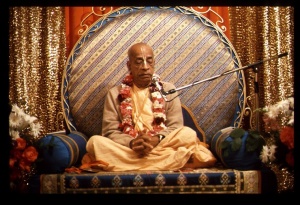CC Madhya 13.149 (1975): Difference between revisions
(Vanibot #0027: CCMirror - Mirror CC's 1996 edition to form a basis for 1975) |
(Vanibot #0020: VersionCompareLinker - added a link to the Version Compare feature) |
||
| Line 2: | Line 2: | ||
<div style="float:left">'''[[Sri Caitanya-caritamrta (1975)|Śrī Caitanya-caritāmṛta (1975)]] - [[CC Madhya (1975)|Madhya-līlā]] - [[CC Madhya 13 (1975)|Chapter 13: The Ecstatic Dancing of the Lord at Ratha-yātrā]]'''</div> | <div style="float:left">'''[[Sri Caitanya-caritamrta (1975)|Śrī Caitanya-caritāmṛta (1975)]] - [[CC Madhya (1975)|Madhya-līlā]] - [[CC Madhya 13 (1975)|Chapter 13: The Ecstatic Dancing of the Lord at Ratha-yātrā]]'''</div> | ||
<div style="float:right">[[File:Go-previous.png|link=CC Madhya 13.148 (1975)|Madhya-līlā 13.148]] '''[[CC Madhya 13.148 (1975)|Madhya-līlā 13.148]] - [[CC Madhya 13.150 (1975)|Madhya-līlā 13.150]]''' [[File:Go-next.png|link=CC Madhya 13.150 (1975)|Madhya-līlā 13.150]]</div> | <div style="float:right">[[File:Go-previous.png|link=CC Madhya 13.148 (1975)|Madhya-līlā 13.148]] '''[[CC Madhya 13.148 (1975)|Madhya-līlā 13.148]] - [[CC Madhya 13.150 (1975)|Madhya-līlā 13.150]]''' [[File:Go-next.png|link=CC Madhya 13.150 (1975)|Madhya-līlā 13.150]]</div> | ||
{{CompareVersions|CC|Madhya 13.149|CC 1975|CC 1996}} | |||
{{RandomImage}} | {{RandomImage}} | ||
==== TEXT 149 ==== | ==== TEXT 149 ==== | ||
| Line 11: | Line 10: | ||
<div class="verse"> | <div class="verse"> | ||
:prāṇa-priye, śuna, mora e-satya-vacana | :prāṇa-priye, śuna, mora e-satya-vacana | ||
:tomā-sabāra smaraṇe, | :tomā-sabāra smaraṇe, jhuroṅ muñi rātri-dine, | ||
:mora duḥkha nā jāne kona jana | :mora duḥkha nā jāne kona jana | ||
</div> | </div> | ||
| Line 26: | Line 25: | ||
<div class="translation"> | <div class="translation"> | ||
" 'My dearest Śrīmatī Rādhārāṇī, please hear Me. I am speaking the truth. I cry day and night simply upon remembering all you inhabitants of Vṛndāvana. No one knows how unhappy this makes Me.' | |||
</div> | </div> | ||
| Line 33: | Line 32: | ||
<div class="purport"> | <div class="purport"> | ||
It is said: vṛndāvanaṁ parityajya padam ekaṁ na gacchati. In one sense, Kṛṣṇa, the original Personality of Godhead (īśvaraḥ paramaḥ kṛṣṇaḥ sac-cid-ānanda-vigrahaḥ | It is said: vṛndāvanaṁ parityajya padam ekaṁ na gacchati. In one sense, Kṛṣṇa, the original Personality of Godhead (īśvaraḥ paramaḥ kṛṣṇaḥ sac-cid-ānanda-vigrahaḥ), does not even take one step away from Vṛndāvana. However, in order to take care of various duties, Kṛṣṇa had to leave Vṛndāvana. He had to go to Mathurā to kill Kaṁsa, and then He was taken by His father to Dvārakā, where He was busy with state affairs and disturbances created by demons. Kṛṣṇa was away from Vṛndāvana, and He was not at all happy, as He plainly disclosed to Śrīmatī Rādhārāṇī. She is the dearmost life and soul of Śrī Kṛṣṇa, and He expressed His mind to Her as follows. | ||
</div> | </div> | ||
Latest revision as of 07:36, 27 January 2020

A.C. Bhaktivedanta Swami Prabhupada
TEXT 149
- prāṇa-priye, śuna, mora e-satya-vacana
- tomā-sabāra smaraṇe, jhuroṅ muñi rātri-dine,
- mora duḥkha nā jāne kona jana
SYNONYMS
prāṇa-priye—O My dearmost; śuna—please hear; mora—of Me; e-satya-vacana—this true statement; tomā-sabāra—of all of you; smaraṇe—by remembrance; jhuroṅ—cry; muñi—I; rātri-dine—both day and night; mora duḥkha—My distress; nā jāne—does not know; kona jana—anyone.
TRANSLATION
" 'My dearest Śrīmatī Rādhārāṇī, please hear Me. I am speaking the truth. I cry day and night simply upon remembering all you inhabitants of Vṛndāvana. No one knows how unhappy this makes Me.'
PURPORT
It is said: vṛndāvanaṁ parityajya padam ekaṁ na gacchati. In one sense, Kṛṣṇa, the original Personality of Godhead (īśvaraḥ paramaḥ kṛṣṇaḥ sac-cid-ānanda-vigrahaḥ), does not even take one step away from Vṛndāvana. However, in order to take care of various duties, Kṛṣṇa had to leave Vṛndāvana. He had to go to Mathurā to kill Kaṁsa, and then He was taken by His father to Dvārakā, where He was busy with state affairs and disturbances created by demons. Kṛṣṇa was away from Vṛndāvana, and He was not at all happy, as He plainly disclosed to Śrīmatī Rādhārāṇī. She is the dearmost life and soul of Śrī Kṛṣṇa, and He expressed His mind to Her as follows.